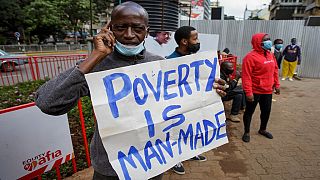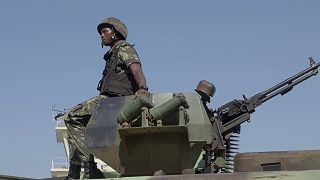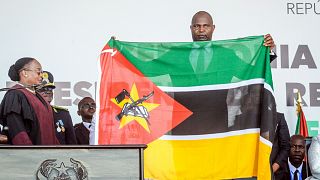Mozambique
Dozens of Mozambican children gather under the shade of a big mango tree in Metuge's resettlement village.
Twice a week aid workers help the displaced children forget the horrors of the war that rages in the country's Northern Province of Cabo Delgado.
After witnessing the atrocities committed by Islamic State linked jihadists , many of them suffer from heavy trauma.
Drawing helps them escape the harsh reality of the conflict.
Mental health workers ask the children -- some of them chubby toddlers who look outwardly happy - to draw anything that comes to mind.
The trauma inflicted on the children from witnessing the extreme violence is laid bare in their drawings.
Some drew military helicopters, while others sketched the makeshift structures that have become their new homes, built from bamboo reeds and mud at the dusty camp.
Seventeen-year-old Alberto Almeida sits behind the smaller children, holding his paper on his right thigh, artfully sketching an assault rifle, then drawing a red X over it.
He captions it "noa khaphutha", which means "no gun" in his native Makua language.
"I drew this gun, this gun, because I am tired of the war," the young man says.
Still haunted by an attack on his village in Bilibiza in the coastal Quissanga district, eyes downcast, Almeida recounted tersely the day in late 2020 when he fled.
"I was forced to leave my home," he said, adding that he wants to return, complete his studies and train as a teacher.
"War hurts," he concluded simply.
An entire section of the village went up in flames, causing residents to flee for their lives, he said.
The torching of homes - as well as the beheading of civilians - is the calling card of the militants linked to the Islamic State group (IS) who have ravaged parts of Mozambique's northern Cabo Delgado province since 2017.
Separated from his parents and his two sisters and a brother who were captured by militants, Almeida walked for five days. By the time he reached the main port of Pemba, his feet were bruised and swollen.
He now lives here in the Metuge camp, 50 kilometres (30 miles) west of Pemba, as does an uncle.
The camp shelters more than 30,000 people who were uprooted from their homes by the extremist violence, which has killed more than 2,800 people.
Ovecome these problems
The drawing initiative has won many traumatised children over, who now come back asking for more.
According to Doctors without Borders Mental health activity manager in Metuge Erickmar Rodríguez, a lot of progress has been made since the launch of the initiative
"So you can see now that they (children) are more open to draw. They are happy to express emotions, and in the beginning people are more reserved, they do not express their emotions that much, they are avoiding the look to each other. But now they come, they approach us, they ask, they draw," she says.
In a neighbouring village, thirty children gather to watch a puppet show, one of the activities organised by Brazilian Catholic Priest Father Silva, who also had to flee Northen Mozambique.
Two men hold up the traditional fabric by the corners, and the priest vanished behind the makeshift screen.
Little puppets mounted on long bamboo sticks emerged from behind the screen, cheerfully greeting the children, voiced by the priest.
Afterwards, they formed a circle and threw a ball back and forth, then enjoyed some candy.
For the children it's "therapy and entertainment, something informal... It is very simple," Silva said.
A way to help them deal with their trauma, and help them forget for a moment a conflict that displaced closed to 700 000 people since 2017, including nearly 57,000 just from the recent attacks on Palma.











Go to video
ICC warns of a dire humanitarian crisis in Sudan as the war rages on
Go to video
First Malaria treatment for babies approved
00:42
Iran's Supreme Leader makes first public appearance since the start of Israel-Iran war
01:11
US imposes sanctions on Sudan over chemical weapons use
Go to video
DRC: Belgian Foreign Minister meets Tshisekedi
Go to video
At least 300 people killed during the post-election violence in Mozambique